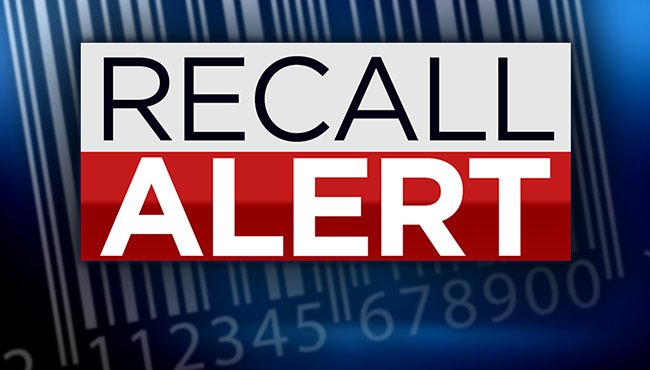What are the biggest recalls in history?
(WHTM) — Although neither customers nor companies like them, recalls are more prevalent than people realize. Companies make mistakes with their products, but many wonder what are some of the costliest mistakes in history.
Peanut Corp. of America’s Salmonella Outbreak – 2009
COST: $12 million
According to a report from NPR, a factory in Georgia owned by the Peanut Corporation of America (PCA) sold peanut butter infected with salmonella. A nationwide outbreak ensued, infecting over 700 people and killing nine.
NPR said when one of the company’s top executives—Stephen Parnell—was told that a shipment was delayed because results of salmonella tests weren’t yet available, Parnell responded in a famous email, “Just ship it.”
Parnell was sentenced to 28 years in prison for his role in the outbreak, along with his brother (20 years) and another executive (five years), per NPR. The case was settled for $12 million, and the PCA filed for bankruptcy in 2009, per Findlaw.com.
Johnson & Johnson’s Tylenol Recall – 1982
COST: $100 million
According to a retelling from Johnson & Johnson, in 1982, Extra Strength Tylenol capsules in Chicago pharmacies were laced with cyanide, resulting in the death of seven people. The New York Times reported that J&J spent $100 million to issue a mass recall of 31 million bottles.
J&J says the company developed an “industry-leading triple tamper-evident seal,” and then returned the capsules to the market.
Polpeo.com called J&J’s handling of the crisis a “masterclass in leadership” and it “has huge lessons for businesses today.” J&J attributed their brand rebound to their policy of “transparency and its effective response to the incidents.”
Toyota’s Floor Mat Recall – 2010
COST: $3.2 billion
According to a CBC report, Toyota was forced to recall over 3.8 million vehicles due to the potential for gas pedals to get stuck in floor mats. CBC said the unintended acceleration in Toyota vehicles caused 89 deaths and 57 injuries from 2000 to 2010.
NPR reported one specific incident in August 2009 in which the sticky floor mats caused a rental car to speed out of control, killing California Highway Patrolman Mark Saylor and his family. According to the DOJ, Toyota reported the recall’s cost at $2 billion in 2010, but four years later, the company paid a $1.2 billion fine to avoid prosecution for covering up their knowledge of the defective mats and other safety problems, totaling $3.2 billion in recall costs.
Takata’s Air Bag Recall – 2008 and counting
COST: $24 billion
In 2008, the now-bankrupt Japanese automotive parts company Takata was forced to begin recalling faulty airbags used by virtually every major auto company on Earth. According to Auto Body News, the airbag’s inflators “can explode and propel metal shrapnel at vehicle occupants even in minor crashes.” Auto Body News says airbag inflators “have now been linked to 28 fatalities in the U.S., with the most recent death occurring in a 2018 crash in Alabama.”
The National Highway Traffic Safety Administration (NHTSA) reports “9 million vehicles from 13 manufacturers can explode and hurl shrapnel into drivers and passengers.” As of April 2024, the Consumer Report says that 88% of the 67 million Takata airbags recalled have been repaired or replaced, however millions of airbags remain at risk.
The Schiffman Firm says Takata’s estimated total recall cost is over $24 billion, however that number is subject to change.
Merck’s Vioxx Recall – 2004
COST: $4.85 billion
After what seemed like a revolutionary breakthrough quickly turned into a catastrophe, Merck’s recall of the nonsteroidal anti-inflammatory drug Vioxx will live in infamy.
According to the National Library of Medicine, similar to Pfizer’s Bextra (an arthritis painkiller from 2005 that caused life-threatening skin reactions and heart issues and was recalled for $3.3 billion), Vioxx became a huge hit for arthritis prescriptions upon its release in 1999. NPR reported that not long after its release, Merck launched a study “hoping would prove that Vioxx was superior to older painkillers, because it caused fewer gastrointestinal problems.”
Instead, the study showed “Vioxx could be deadly, causing heart attacks and strokes.” Five years later, the drug was withdrawn, but billions of Americans had already taken the drug, causing over 88,000 Americans to have heart attacks, and 38,000 deaths, per NPR.
NPR added that in November 2007, Merck announced it would pay $4.85 billion “to end thousands of lawsuits over its painkiller Vioxx.” The amount, to be paid into a so-called settlement fund, is believed to be “the largest drug settlement ever.”
Copyright 2024 Nexstar Media, Inc. All rights reserved. This material may not be published, broadcast, rewritten, or redistributed.
For the latest news, weather, sports, and streaming video, head to ABC27.


